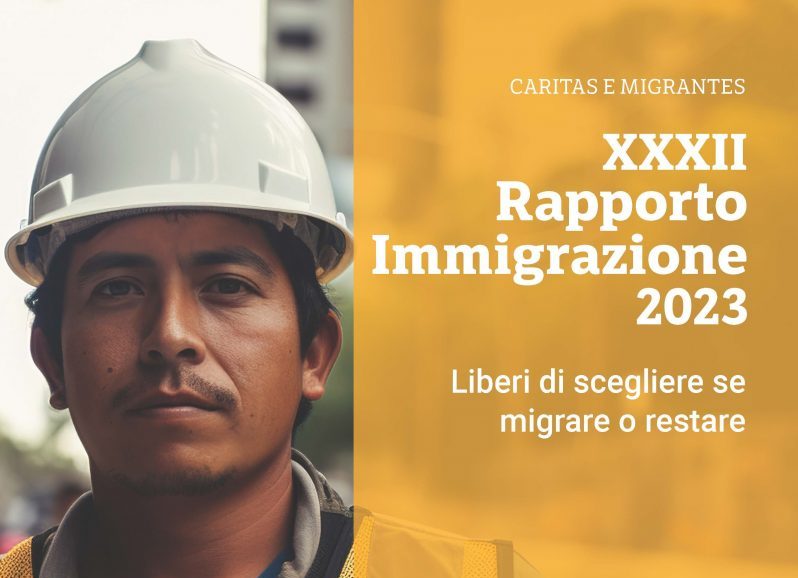The XXXII Immigration Report of Caritas Migrantes was presented this morning: the number of foreigners present in Italy is stable, just over 5 million. Among those employed, a third live in a condition of absolute poverty. «Welcoming and integration require mutual availability for an “encounter””, said the general secretary of the CEI, Monsignor Giuseppe Baturi.
As of 1 January 2023, ISTAT estimates indicate the presence of 5,050,257 foreign citizens resident in Italy, a slight increase compared to the definitive data referring to the previous year (5,030,716), mostly in Northern Italy (59.1% of total residents). As for the main nationalities, in addition to the consolidated first position of Romanian citizens, and the subsequent second and third of Moroccan and Albanian citizens (which stand at 8.4% and 8.3% of the total), we increasingly notice a rotation of Asian origins (from the South East, in particular): those with a more historical presence (such as China and the Philippines) are decreasing, while those of more recent arrival (such as Bangladesh and Pakistan) are consolidating their migratory path in Italy. These are some of the data that emerge from the XXXII edition of Immigration report produced by Caritas Italiana and Fondazione Migrantes presented this morning in Rome. According to the data provided in the Report, the new foreign births from 2012 to 2021 decreased by 28.7%, going from almost 80 thousand to less than 57 thousand: for a decade now the number of new foreign births has been constantly decreasing and increasingly (-5% in the last two years).
As regards foreign workers, for non-EU workers the employment rate stood at values slightly lower than the average (59.2% against 60.1%). With reference to the types of contracts, 87% of foreign workers are employees and the remaining 12.9% have a self-employment contract. 75.2% of non-EU employed people work as workers (compared to 31.6% of Italians), while only 1 in 10 is an employee and just 0.1% is a manager. Among the major critical issues is the poor involvement of non-EU women in the labor market in Italy.
Added to the fragilities of those without a job are those of those who have a job: the phenomenon of in-work poverty has recorded a strong upsurge in recent years, among foreign and non-foreign citizens: according to the latest ISTAT estimates, 7% of employed people in Italy live in a condition of absolute poverty, a percentage that rises to 13.3% among less qualified workers and 31.1% among foreigners.
The total of students with non-Italian citizenship in the 2021/2022 school year, it is 872.360and the percentage of those born in Italy grows increasingly up to 65.6%, with even higher peaks for some nationalities, such as Chinese (88%), Moroccan and Filipino (both over 75%): a reality still not intercepted by the legislation on the acquisition of citizenship.
Compared to the previous year, there was a increase in the entry of minors into prison, both Italian and foreign: a sign of dynamics of youth discomfort, which are also expressed in the phenomenon of youth gangs.
The topic of culture is as significant for the understanding of our society as it is broad and heterogeneous. Even in the aftermath of the war in Ukraine, the “voices” of migrant people in Italian information are increasing, but not everyone is offered equal opportunities to express themselves. On the other hand, there is a need for greater involvement of people of foreign origin in journalistic editorial offices and on topics not only related to mobility, but to current affairs, politics, economics and in every area of daily life.
«Knowledge of the many aspects of immigration – without neglecting the reasons that lead to leaving one’s home and country – is useful for understanding its real scope and ‘face’, also in relation to the relationship between the people who arrive and the society that welcomes”, he writes at the beginning of the volume Monsignor Giuseppe Baturi, archbishop of Cagliari and General Secretary of the Italian Episcopal Conference. For the general secretary of the CEI, «welcome and integration require mutual availability for an “encounter” that is respectful of both parties. The path in this sense appears full of questions, even tensions: for this reason it is “necessary – as stated in the Report – a change of narrativeto overcome that of the emergency””.
The article Free to choose whether to migrate or stay seems to be the first on World and Mission.
